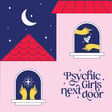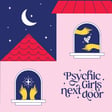
Episode 36: The Healing Power of Herbs and Ancestral Traditions with Laura Ash from Scarlet Sage and Land of Verse
Laura Ash is a wellness entrepreneur. She's the CEO and founder of Land of Verse, clinical herbalist, and owner of the Scarlet Sage Herb Company, now located on Fillmore St. in San Francisco, CA.
As a child, Laura struggled with pneumonia. Western medicine always worked for her, but even after clearing her dose, she always felt like she was still in the healing. At 19, Laura suffered from pneumonia again, and this time around, Laura decided to try something different from the antibiotics. She went into a used bookstore and looked up the aromatherapy section. She came across a book by Jean Valnet, "The Practice of Aromatherapy." She looked up pneumonia and found out that there were essential oils that would help with that.
Laura went into a food store and bought lavender oil. She started having it in her water a couple of times daily, and in two weeks, her pneumonia was cured. This experience sparked an interest in herbs in Laura, and it became the beginning of a fantastic journey. In this episode, we had an incredibly insightful conversation about herbal medicine, ancestral traditions, and the challenges of running a business in the wellness industry.
Listen to learn more.
Key Talking Points of the Episode:
[01:01] Getting to know Laura Ash
[05:54] How Laura moved to San Francisco
[09:06] Laura's quest for global herbal medicine preservation
[14:11] Services and classes offered at Land of Verse
[17:58] Challenges Laura has faced as an entrepreneur
[23:28] Laura's advice to new entrepreneurs
[26:11] Laura's wellness kit
[33:41] How does Laura achieve work-life balance?
Magical Quotes from the Episode:
"Everyone has some stories and songs that they have with their tradition, whether it's through ceremony or ritual. There's always a plant associated with those."
"Don't put your own money unless you are someone born with wealth. You can play with money."
"If you have the finances to get smeone to support you in your journey, do it."
Note: This podcast is for informational and entertainment purposes only
Resources:
Scarlet Sage
Land of Verse


